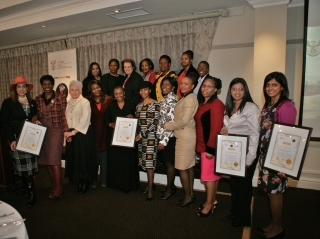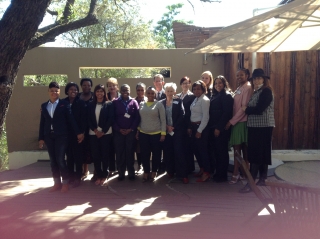WOMEN ON BOARDS PROGRAMME ATTRACTS NOTEWORTHY BOARD VACANCIES
We are thrilled to announce that both the public and private sectors appear to recognize the value of board diversity as BPW SA has been approached in the last month alone, to assist with eleven board vacancies for women on our Register. Women and men have different interests and perspectives in important areas, and boards are starting to see the importance of utilising these varying experiences to tackle the tremendous challenges.
BPW SA and the Department of Trade & Industry (the dti) want boards of directors to widen the search for talent by looking beyond the traditional pool of executives and bring new potential to light. It is for this reason that we have joined forces to provide a Women on Boards programme to create a Register of female leaders in South Africa who are excellently trained and, as a result, are highly sought after by Boards. After all, why on earth would you voluntarily exclude half the smart people?
Our first group of 19 senior women, all thoroughly trained through our 9-month Women on Boards director development programme and certified by the dti, are now available on our register of Board Potential Women Directors and we urge companies to contact us for potential female directors.
Seven of our graduates are in line for board interviews , many have been interviewed by the media – both radio and magazines – and all will be profiled in the KZN Chamber of Commerce Power Book (2015). As an ongoing service to the graduates, BPW SA continues to raise their profile in an effort to access suitable board placements. We have proven that board diversity is not a supply problem, but rather a demand problem.
BPW SA is proud to announce that we have incorporated an international module into the Women on Boards programme. Business acumen - incorporating business finance and strategy - a must in today’s complex landscape. Business acumen is a keen understanding of what it takes for an organization to make money. It combines financial literacy – the ability to interpret numbers on financial statements – with business literacy – recognizing how strategies and decisions impact these numbers. Call it a sophisticated business simulation. Call it an exercise in experiential learning. Or call it a board game. Whatever you label it, the simple fact is that the training is fun and will gives participants a true competitive edge.
A recent Women on Board graduate, Tebogo Maziya, who holds a Masters degree in Science, a postgraduate diploma in finance and a B Comm degree says the nine-month journey has been fulfilling. “I learnt there’s a risk and that that risk is manageable. So it’s important for the board to be transparent and accountable and for a board member to be aware of decisions made because they will be held accountable.” Another graduate, Amantha Maharaj, a BSc electrical engineering graduate with an MBA, who works a top management level at an engineering consultancy says of the programme: “It teaches one to know how a board is structured, what to do, and questions one needs to ask when sitting on a board. It also teaches business risk and how one should view business from a higher level. It was certainly value for money.”
For more information about our Women on Boards Programme, please visit our website at www.bpw-jhbsa.co.za or contact us at This email address is being protected from spambots. You need JavaScript enabled to view it. or (011) 794-4991.
WHERE ARE SOUTH AFRICA’S POTENTIAL WOMEN DIRECTORS?
They are in South African companies and industries right now, although they may not be part of traditional networks and are unlikely to be present at the higher levels of management in the same numbers as men. It is for this reason that BPW SA and the Department of Trade & Industry (the dti) have partnered in an unrivalled “Women on Boards” director development programme to create a pool of female leaders in SA who are excellently trained and are therefore highly sought after by Boards.
Most people today have no knowledge about the makeup of corporate boards, even in the companies they work for. These people would be surprised to learn how little diversity of thought and experience exists in the corporate boardrooms and executive suites of South African businesses. Why should you care about board composition? Boards of directors make decisions that can impact you, your community, and the country. That’s why it’s important that membership on corporate boards be representative of a company's constituents.
Boards of directors choose CEOs. They make decisions about executive compensation, whether to buy, sell, or merge with other companies, where corporate offices close and relocate, and how much priority a company gives to issues other than profits, such as social responsibility.
Our Women on Boards programme will give you the expertise and exposure needed to be part of the right networks. It is an eight-part program — strategically placed over the course of 8 months, due to the complexity of the material — equips women with the knowledge and tools needed to elevate themselves to the C-suite and beyond. In a supportive and highly interactive atmosphere, an impressive roster of top government and corporate experts will guide skilled female executives through a rigorous program of intensive classroom instruction, case studies and simulations. Every element of the program is focused on strengthening and broadening the leadership talents of the participants and delivering positive results for their companies and organizations. They will improve their understanding of the responsibilities of board membership and develop the skills and strategic insight needed to become a more effective director. They will improve their understanding of board governance while heightening their financial literacy and increasing their understanding of relevant legislation. Amongst others, specialist training is also provided by the Johannesburg Stock Exchange (JSE) with regard to corporate governance and understanding of JSE terminology and the Commonwealth Business Council (CBC) (London) who will impart their expertise on personal and reputational risk. The dti will convey their expectations of board members and corporate experts will present, and execute simulations, on media and presentation skills to enhance leadership effectiveness. The programme is certified by the dti.
For more information, please visit our website at www.bpw-jhbsa.co.za .or contact This email address is being protected from spambots. You need JavaScript enabled to view it. or 011 794-4991.



